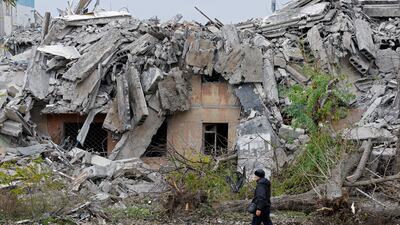Five years ago, UN Secretary General Antonio Guterres told a meeting of the Security Council that while the world faced fewer instances of armed conflict in this new century than the one before, today’s wars are becoming not only more complex, but also more protracted. There are, however, exceptions. Few conflicts have been as swift and decisive as the August War between Russia and Georgia in 2008, which lasted a mere 12 days.
Many aspects of the build-up to the August War may seem familiar in light of this year’s events in Ukraine. Moscow accused Tbilisi of a campaign of oppression against Georgia’s ethnic Russians, and launched an invasion of the South Caucasus ostensibly to protect the breakaway republics of South Ossetia and Abkhazia. While the political issues driving the war remain unresolved – Georgia has lost effective control of the republics, but only Russia recognises their independence – the French-negotiated ceasefire that ended it has held for the past 14 years.
In Ukraine, where Russia has pursued in some respects a similar campaign, expectations for a similarly speedy ceasefire have been dashed. The war in Ukraine has dragged on for nine months, and if it continues unabated, by the end of February it will have hit the one-year mark. An urgent push in international diplomacy is needed right now in order to prevent the Ukraine war from going the way of others in the 21st century, such as Afghanistan, Iraq, Syria and Yemen - that is, a multi-year conflict.
The chances of averting such an outcome are higher now than they have been in recent months, in large part because the appetite for continued conflict is particularly low. The widespread fears of a global economic downturn that took hold at the start of the war have now been realised; few will deny the war’s role in sky-high inflation, a squeeze in energy markets and an ongoing food crisis in the developing world. Voters in Europe and North America, whose capitals support the Ukrainian government, are increasingly anxious about supporting a war effort with an indefinite timeline. Ordinary Russians, who must deal with the impact of sanctions on top of inflation and the generalised consternation that comes with being a country at war, share that anxiety. And Ukrainians, most of all, have borne nine months of extraordinary suffering.
The news that Russian President Vladimir Putin will not attend the G20 summit, taking place next week in Bali, means that an opportunity for talks between Russia and the West in a relatively neutral country is being missed. But it is not the only opportunity. Earlier this week, the White House confirmed the existence of ongoing, high-level communications with the Kremlin, showing that there is an understanding of the need for talks soon. With the US fresh out of midterm elections, the results of which demonstrated, among other things, the appeal of some politicians calling for a review of Ukraine support, President Joe Biden has every incentive to keep exchanges with Moscow going.
A lasting peace for Ukraine is unlikely to take a shape that fully satisfies all parties – most of all the Ukrainian government, which has found itself in a war it neither asked for nor deserved. It will be critical for all sides to preserve Ukrainian sovereignty and to take into account Russian red lines (and these red lines must be drawn by Moscow in a way compatible with a lasting armistice). The outcome may be, as it was in Georgia, a cold, costly and psychologically painful peace. But in a world where conflict continues to burn in too many places, peace in Ukraine would present enormous relief.


